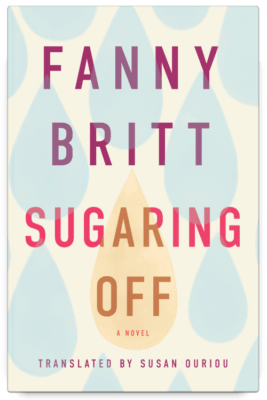In Sugaring Off, a near-death experience, a sugar shack, and the search for belonging intersect, taking readers on a journey that examines how certain experiences are valued over others, and delving headfirst into themes of privilege and belonging. Fanny Britt’s novel, originally released in 2020 as Faire les sucres, has been diligently translated by Susan Ouriou and republished by Book*hug Press in October 2024.
After crashing into Celia, a local Black teenager, in a near-fatal surfing accident in Martha’s Vineyard, Adam Dumont, a middle-aged celebrity chef, descends into a crisis that forces him to grapple with the fractures in his personal life. Disconnected from his kids, and struggling to maintain a strained relationship with his mother, he discovers that one thing his wealth cannot purchase is the sense of family that he longs for.
Sugaring Off Book*hug Press
Fanny Britt
Translated by Susan Ouriou
$24.95
paper
228pp
9781771669085
To quell what appears to be an amalgamation of PTSD and a mid-life crisis, Adam does what anyone else would do during a rough patch: he spends thousands of dollars on a sugar shack. After purchasing the shack from the Sweet family, Adam hires them to work with him, attempting to find what he believes to be a substitute for the strong familial connections absent from his own life.
For me, the highlight of Sugaring Off was Britt’s knack for creating complex characters that you can simultaneously enjoy spending time with and resent. Initially, I felt sympathy for Adam after the surfing incident, especially as he reflected on and took responsibility for the event, despite its accidental nature. His question, “How can you sleep when that poor girl is suffering?” resonated with me. However, my sympathy began to erode when he started working with the Sweet family, embedding himself into their lives and developing an air of entitlement. In one emotional scene, Adam interrupts a private moment where the Sweet family are grieving, shifting the focus to himself and denying them the space they need.
I was particularly drawn to Marion’s character. At the beginning of the novel, her compassionate nature is evident in both her actions and her inner monologue–for instance, when she makes concerted efforts to connect with her moody teenage stepdaughter, or casually commits insurance fraud at her own dental clinic to ensure a patient won’t overpay. As the story progresses, it’s interesting to witness her empathy begin to wane, a shift that adds a layer of complexity to her character. As a reader who appreciates nuanced female leads, I found Marion’s descent into self-indulgence particularly compelling, especially since her consideration for others is one of the traits Adam admires most about her: “Over the years, Marion had cottoned on to Adam’s weakness for her empathetic traits, and it tickled her,” writes Britt. Observing Marion succumb to her own desires through a series of impulsive decisions, as opposed to simply appeasing Adam – especially as I anticipated how this recklessness would unfold – kept me glued to the page, wondering what she would do next.
Although Adam and Marion are well-developed characters, I would have liked to spend more time with Celia. Readers have limited access to her perspective after the accident, leaving her character feeling flat. Through the limited exposure we are granted, it’s evident that Celia’s side of the story holds a lot of promise. Her perspective as a young Black woman not only adds an essential layer of commentary on privilege in a story centred on two upper-class, white protagonists, but with more focus on Celia’s viewpoint, it could have also offered a deeper exploration of how trauma impacts individuals and their relationships over time.
Sugaring Off challenges readers to confront their assumptions about privilege, and examines the cost of self-indulgence. Adam’s journey left me reflecting on the ways in which we try to mask deeper insecurities and repair broken connections. I couldn’t help but appreciate the outlandish solution to his predicament – one that Québécois readers will surely enjoy. Because nothing says “finding yourself” quite like investing in a sugar shack: here’s to hoping for a sweeter deal.mRb






0 Comments